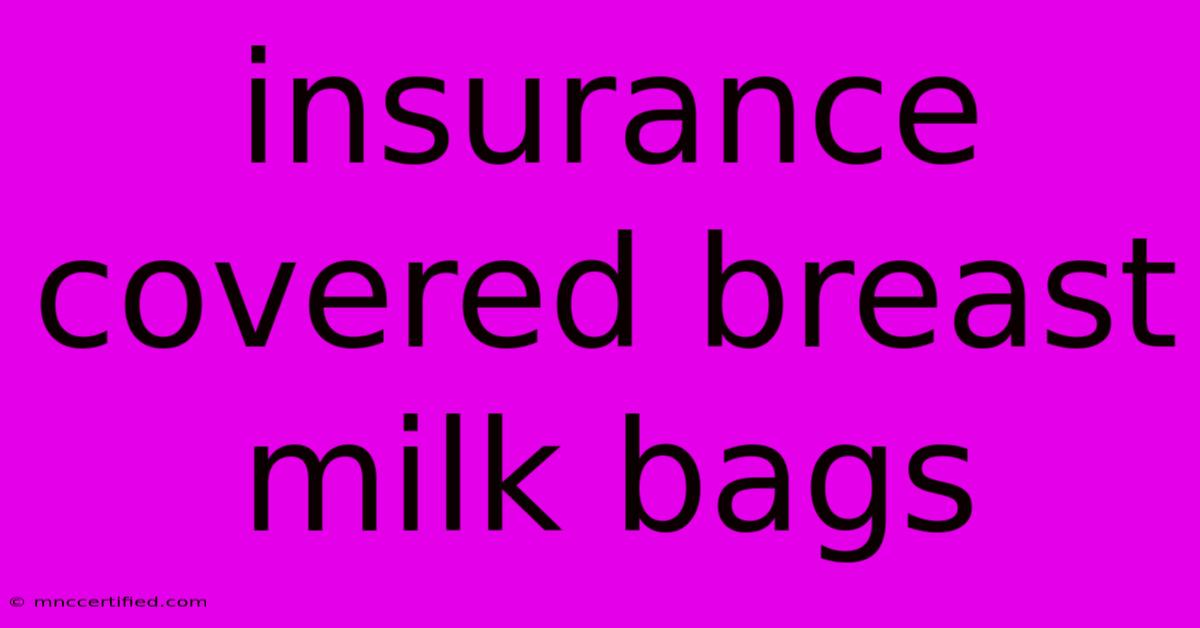Insurance Covered Breast Milk Bags

Table of Contents
Insurance Coverage for Breast Milk Bags: A Comprehensive Guide
Are you a breastfeeding parent wondering if your insurance covers the cost of breast milk storage bags? The short answer is: it depends. While there's no guaranteed nationwide coverage, many insurance plans offer some level of reimbursement or direct coverage for breastfeeding supplies, including breast milk bags. This comprehensive guide will help you navigate the complexities of insurance coverage for this essential breastfeeding item.
Understanding Your Insurance Policy
The first step is understanding your specific health insurance policy. Carefully review your policy documents, looking for sections related to:
- Maternal and newborn care benefits: Many insurance plans offer coverage for supplies related to breastfeeding and postpartum care. This is where you're most likely to find coverage for breast milk bags.
- Durable medical equipment (DME): While seemingly unrelated, some insurers may categorize breast milk bags as DME, especially if you're using them for medically necessary reasons (e.g., storing milk for a premature infant).
- Prescription benefits: In some cases, a doctor may prescribe breast milk storage bags as a necessary medical supply, potentially opening the door to coverage under your prescription drug plan.
What to Look for in Your Policy
Pay close attention to these key aspects within your policy:
- Specific items covered: Does the policy explicitly list "breast milk storage bags" or more general terms like "breastfeeding supplies"?
- Reimbursement vs. direct coverage: Some plans offer reimbursement after purchase, requiring you to submit receipts. Others may allow you to purchase supplies directly through an in-network provider.
- Quantity limits: Policies might place limits on the number of breast milk bags they'll cover.
- Provider network: Ensure the retailer or supplier where you plan to purchase the bags is in your insurance network to maximize savings.
How to Maximize Your Chances of Coverage
- Talk to your doctor: Your physician can write a prescription or letter of medical necessity, strengthening your case for coverage, particularly if your baby has special needs.
- Contact your insurance provider: Directly contacting your insurance company's customer service is crucial. They can clarify your policy’s specifics regarding breast milk bag coverage. Ask about pre-authorization procedures if necessary.
- Explore your employer's benefits: If your employer provides health insurance, check if they offer additional resources or programs supporting breastfeeding mothers.
Alternatives if Insurance Doesn't Cover Breast Milk Bags
If your insurance doesn't cover breast milk bags, consider these options:
- Generic brands: Generic breast milk bags are often more affordable than name brands.
- Bulk purchases: Buying in bulk can often reduce the per-unit cost.
- Online retailers: Compare prices from various online retailers to find the best deals.
- Support groups and community resources: Local breastfeeding support groups or community organizations might offer resources or assistance.
Keywords for On-Page Optimization
This article strategically incorporates keywords throughout the text, including but not limited to:
- insurance coverage breast milk bags
- breast milk storage bags insurance
- breastfeeding supplies insurance
- covered by insurance breast milk bags
- breast milk bag reimbursement
- insurance breastfeeding supplies
- breast milk bag cost
- how to get insurance to cover breast milk bags
- durable medical equipment breast milk bags
Off-Page SEO Strategies
To further boost this article's ranking, consider these off-page strategies:
- Guest blogging: Write guest posts on related websites (parenting blogs, health websites) linking back to this article.
- Social media promotion: Share the article on relevant social media platforms to increase visibility.
- Backlink building: Reach out to other websites in the parenting and healthcare niches to request links to your article.
- Forum participation: Engage in relevant online forums and provide helpful answers, naturally linking back to this resource where appropriate.
By following these steps and consistently creating high-quality content, you can improve your article's ranking on Google and help more breastfeeding parents find the information they need. Remember, always consult your insurance policy and healthcare provider for the most accurate and personalized advice.

Thank you for visiting our website wich cover about Insurance Covered Breast Milk Bags. We hope the information provided has been useful to you. Feel free to contact us if you have any questions or need further assistance. See you next time and dont miss to bookmark.
Featured Posts
-
Insurance Companies In Stockton Ca
Nov 16, 2024
-
Vernon Kays Radio 2 Future Uncertain
Nov 16, 2024
-
World Cup Qualifiers Paraguay Vs Argentina
Nov 16, 2024
-
Tyson Paul Fight Purse Pay And Prize Money
Nov 16, 2024
-
Erivos Gorgeous Wicked Whistle Song
Nov 16, 2024